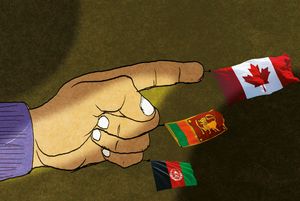It is election season both in India and abroad. Narendra Modi is chief campaigner in Maharashtra and Haryana—the first elections after the withdrawal of special status to Jammu and Kashmir. For his government, results in three international elections also hold special interest.
Afghanistan saw a low turnout because of the difficult terrain and the threats from Taliban, which boycotted the polls. Results are due on November 7. Both President Ashraf Ghani and his challenger Abdullah Abdullah are good friends of India, but the resumption of talks between the US and Taliban, with Pakistan actively involved, has major national security implications. Modi has briefed President Donald Trump and has received assurances that Indian interests would not be affected, despite Pakistan’s belligerence over Kashmir.
The election in faraway Canada is being watched both by the national security team in Delhi and the Amarinder Singh government in Punjab. Liberal Prime Minister Justin Trudeau is seeking another term on October 21. He is being challenged by conservative leader Andrew Scheer and the New Democrats, led by Jagmeet Singh, the first Asian-origin politician to lead a Canadian party at the national level. (His turban did become an election issue, with suggestions that he should have a western appearance.) Trudeau, the charmer, has not been trusted because of a perception that his government and party are not keen to rein in the pro-Khalistan sentiment among Canadian Sikhs.
Trudeau’s visit to India was seen as a disaster and his national security adviser blamed “rogue elements” in the Indian government for it. But diplomats on both sides have subsequently worked at restoring the balance. However, there will be comfort if Scheer comes to power as conservative prime ministers like Stephen Harper were friendlier. The Indians are still unsure about the political preferences of Jagmeet, a criminal lawyer, whose party has roots in eastern Canada.
Earlier opinion polls had said Scheer could form a government on his own, or with the support of the New Democrats. Latest polls indicate Trudeau would come back. Canada, a major repository of natural resources, also has a large number of high-skilled Indian workers and students. While Trudeau welcomes immigrants of all hues, including Muslims under persecution, Scheer’s agenda shows preference for Christians who are facing trouble in Islamic countries. Jagmeet has vowed to continue the open secular traditions of Canada.
The third election of interest to India is for the presidency of Sri Lanka. Maithripala Sirisena has decided not to seek a second term and will support former defence minister Gotabaya Rajapaksa. Five years ago, Sirisena had revolted against the policies and dynastic politics of then president Mahinda Rajapaksa, Gotabaya’s elder brother. Sirisena was the candidate of a rainbow coalition of the rebels—United National Party (UNP), ethnic minorities and the powerful Buddhist clergy. India had been happy with his victory, as Mahinda had tilted away from India towards China, allowing Chinese military presence in the island nation.
Sirisena and the UNP shared power. But soon, Sirisena was uncomfortable with UNP supremo and Prime Minister Ranil Wickremesinghe. He dismissed Wickremesinghe and installed Mahinda as prime minister, but parliament refused to oblige and Wickremesinghe was back within two months.
This time, the UNP picked Sajith, son of assassinated president Ranasinghe Premadasa. Sajith has been popular as housing minister, but Gotabaya has had a head start in campaigning. New Delhi will be more wary of a Gotabaya presidency.
sachi@theweek.in


